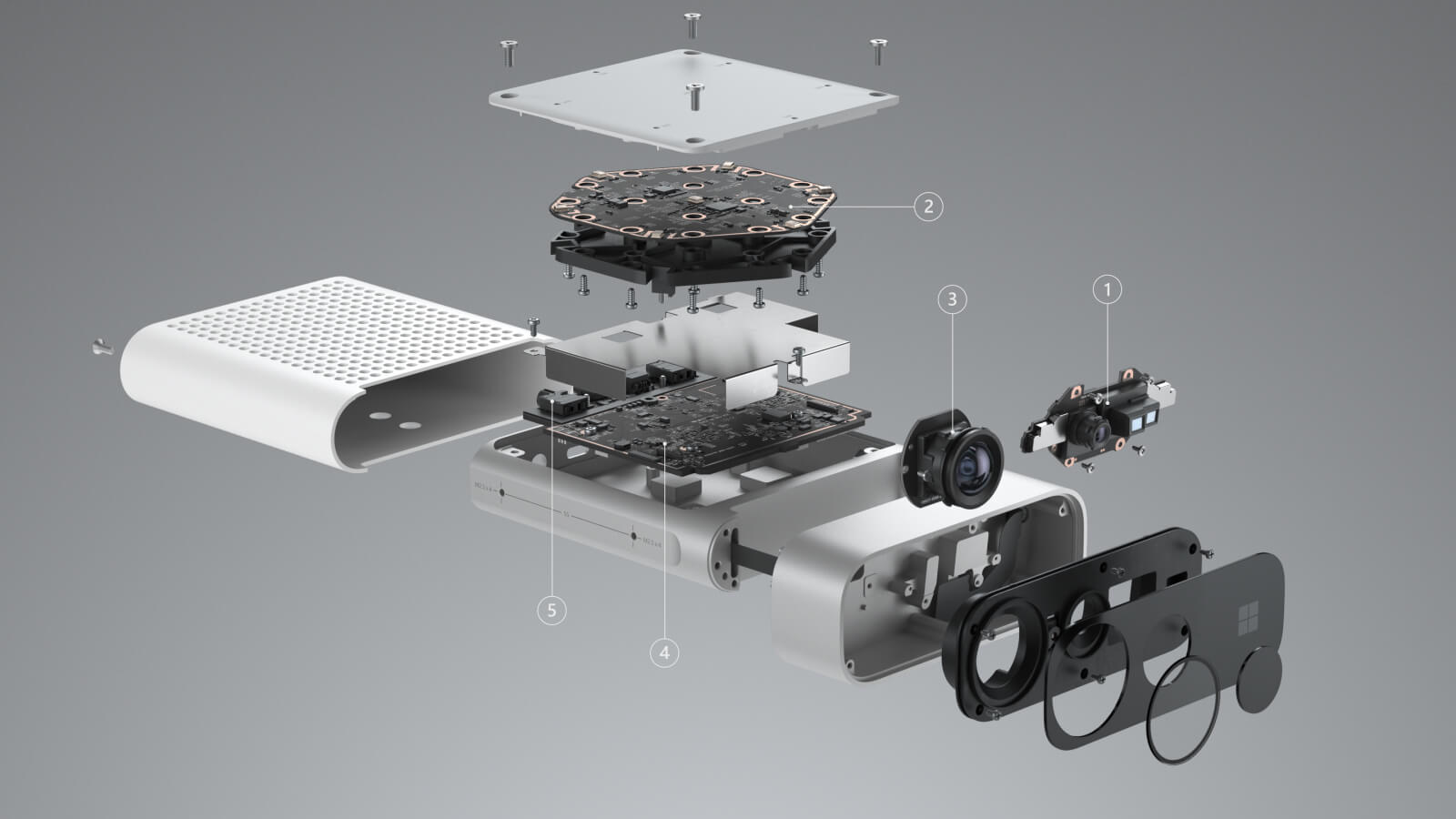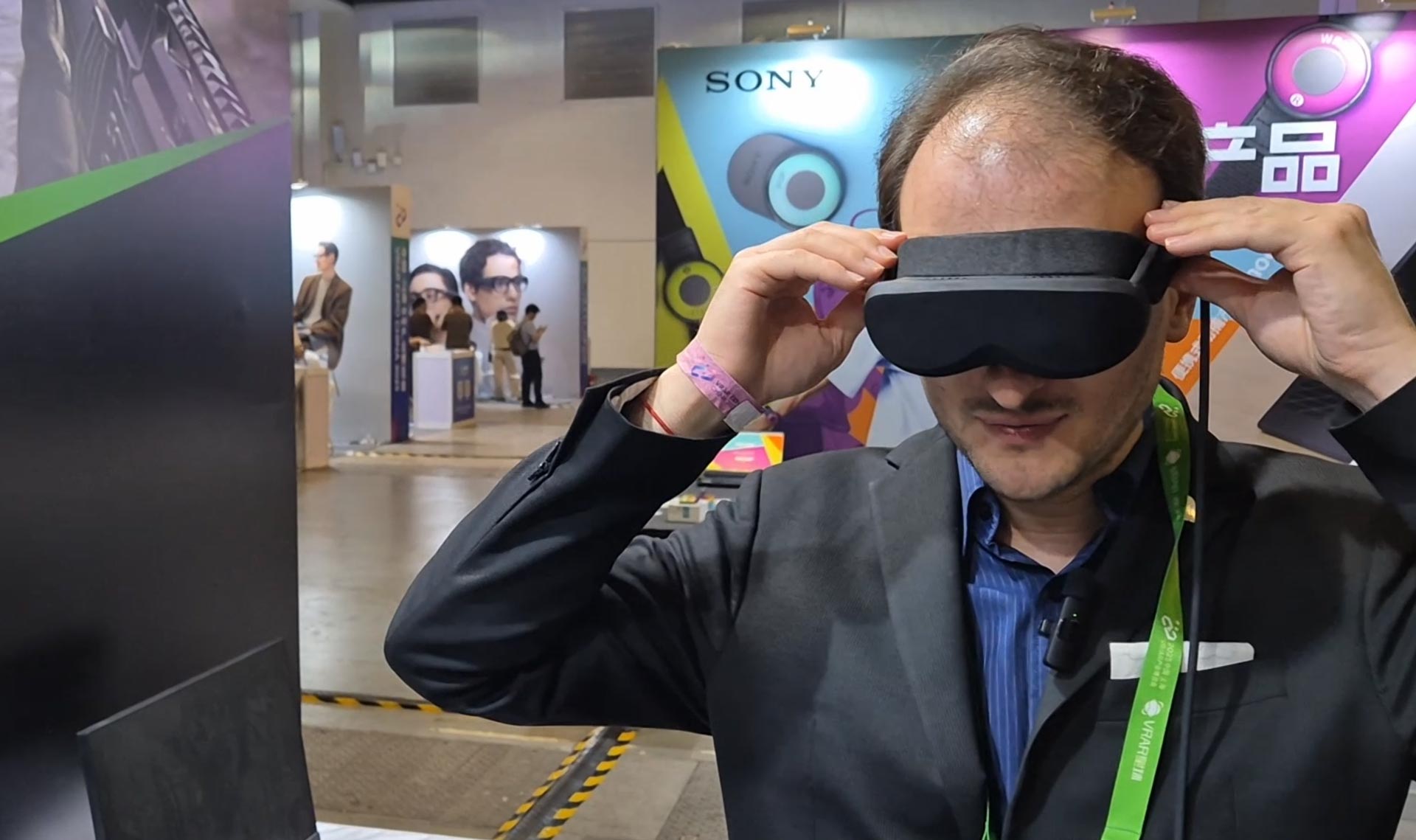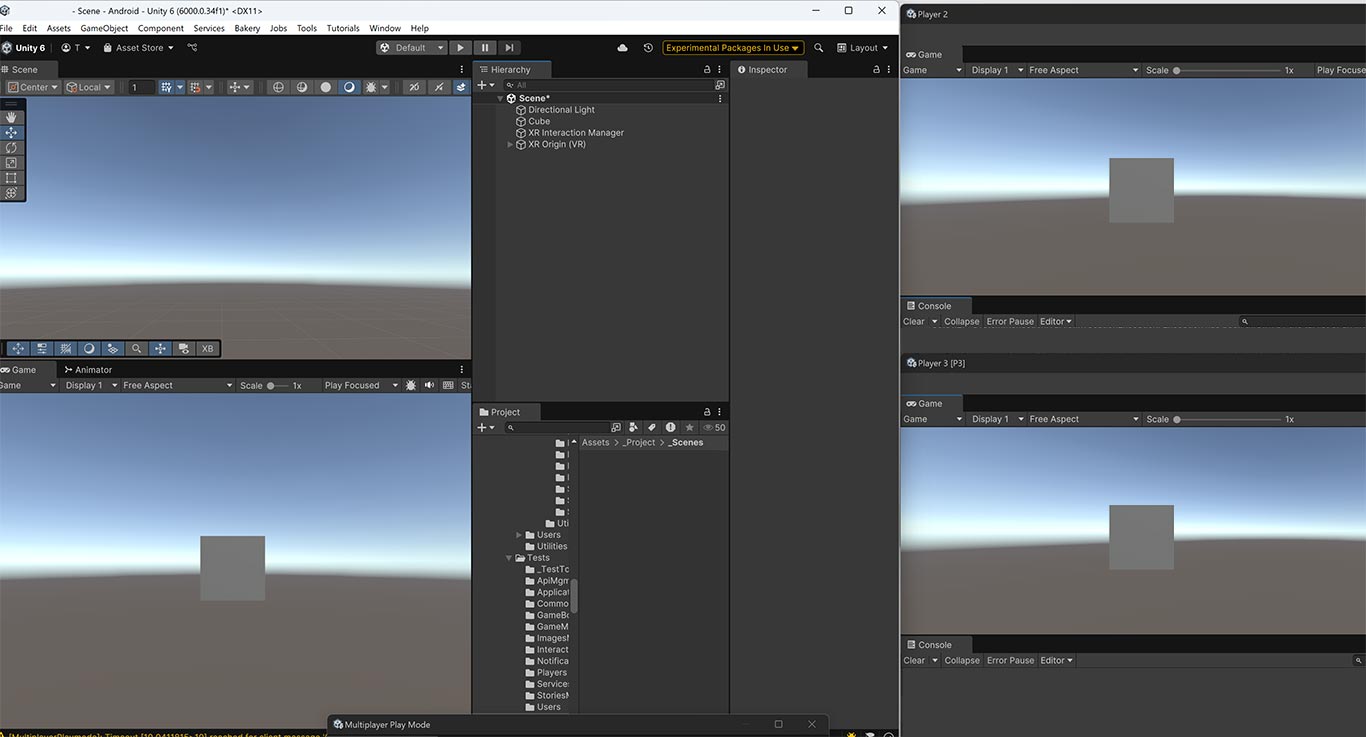The XR Week Peek (2023.08.22): VRChat Android alpha released, Kinect For Azure discontinued, and more!
It’s been a very pleasant week for me: on the 15th I celebrated the 7th Birthday of my blog, and it was terrific to receive greetings, compliments, and kind words from many people in the community! I’ve even been mentioned on Forbes by the amazing Charlie Fink! I thank you all for the love you made me feel that day, I’m still blushing!
And what is a better way of celebrating my blog’s birthday than writing a new fantastic roundup of the best XR news of the week? 😉
Top news of the week

VRChat Android Alpha is now live
After the announcement a few months ago, VRChat has finally launched its mobile Android version in alpha. The team stresses that it is truly an alpha, so the application may be very buggy in some contexts, but they want to start distributing it to get the feedback of the community. To make the rollout very gradual, at the beginning, the application will be available only to the subscribers of the paid VRChat Plus service.
As for compatibility, the application should be able to run on most mid-level Android phones. No version has been released for iOS, but the company says that its development is going smoothly, so I think that hopefully, we can see a beta for that platform in the next months, too.
VRChat aims at a potential full release to all VRChat users before the end of the year, but they are not committing to any date, yet.
I am very intrigued by this piece of news because I am very interested to follow its developments. RecRoom started as a very popular VR app, then it has been ported to all platforms, and now it is an ultra-popular social 3D space, with mobile users being much more than VR ones. VRChat may follow the same route: it is a very famous platform for PC and VR users and has the potential of having enormous growth on mobile. Let’s say that with this release VRChat has the chance of becoming truly big, maybe becoming the next unicorn, and I want to see if this happens. Of course, I wish the best of luck to the VRChat team and community for a very successful launch (and growth) on mobile!
Other relevant news

Microsoft discontinues Kinect for Azure
Microsoft has decided to discontinue its latest iteration of the Kinect sensor, dubbed Kinect For Azure DK.
This piece of news touch me personally: some of you may remember that my first startup was called Immotionar and was about full-body VR performed through Kinects. One of the many problems of that project was that we used Kinect v2 sensors, which had just been declared discontinued by Microsoft, which so wasn’t fixing the problems on its runtime, leaving us with a buggy solution.
Now it seems that this is happening again. Microsoft will stop selling its Kinect For Azure sensor in October 2023, or until the supplies last. I guess the reasons for discontinuation are that the current bad economic conditions are forcing the tech giants to cut all the non-essential projects, and for sure Kinect is not the hardware bringing the most revenues to Microsoft. But the problem is that the Kinect For Azure, like it was the Kinect v2 back in the times, is an amazing camera at an affordable price, and so was widely used in research centers. In the VR field, it was employed for experimentations both with full-body VR and affordable volumetric videos. It’s a pity that the teams working on this topic will have difficulties in finding their needed hardware.
But it seems there is a bit of hope this time. Microsoft has licensed its technology to three third-party companies that can so build devices similar to Kinects. One of these partners is Orbbec, which has been well-known for many years for producing sensors that are affine to Kinect. According to what is possible to find online, developers can even migrate their existing Azure Kinect Developer Kit-based apps to the Orbbec Femto Mega using the API bridge provided as part of its SDK. This seems good.
But what is not clear to me is what will happen with Microsoft runtime. What is great about Kinect is not only the hardware but also its accompanying software, with for instance great ML algorithms for full-body VR. For now, Microsoft says that people using that software can keep using it, but will this software still be updated? Will it be available for use with other sensors? Because if not, then it’s a great loss on its own.
RIP Kinect, again.
Some new leaks on the Apple Vision Pro
This has been a quite positive week to discover news about the Apple Vision Pro, thanks to a few leaks about it.
The one that has been shared the most in the community regards a journalist of Apple Insider that has been able to try the device for a long session thanks to the courtesy of one of the developers having a Vision Pro devkit. My thoughts and prayers go to the dev team that violated the NDA of the Apple Vision Pro: Apple will find them and sue them to hell. RIP that team.
This hands-on session doesn’t bring much more information than what we already knew. The most important tidbits are:
- The field of view of the device seems good, and the vertical FOV is twice the one of HoloLens
- The passthrough quality is astonishing, and it almost seems there is no passthrough screen
- The virtual keyboard is ok to use, but it has all the difficulties of all the other purely virtual keyboards
- The device didn’t give eye strain to the journalist, but after one and a half hours, he started feeling neck strain
In another alleged leak from a Chinese display manufacturer, the Apple Vision Pro display is claimed to have 3648×3144 resolution, 90–100Hz framerate, and 5000 nits of brightness. While another leak talking about storage says that the device features 1 TB of internal storage, at least for one of the models that will be distributed. It is plenty of space where to save 3D photos and videos.
More info (Hands-on Apple Vision Pro)
More info (Apple Vision Pro display leak)
More info (Apple Vision Pro storage leak)
News worth a mention

Quest 3 may come with a charging dock
Some certifications documents from the FCC show details about a charging dock for the Meta Quest 3. One interesting detail about this dock is that it charges the headset via 3 pins that are located at its bottom, but especially it charges the controllers wirelessly. It seems that controllers may work with an AA battery each, and if this battery is rechargeable, it may be charged wirelessly via this dock. This seems like a great solution to me.
It is not clear if the dock will be included in every Quest 3 box or will be sold as a separate accessory. My bet, given the price of Quest 3, is that it will be an accessory.
More info (Quest 3 charging dock — Road To VR)
More info (Quest 3 charging dock — Upload VR)
Pico 4 bets on hand tracking
In its latest runtime update, Pico has added many improvements to Pico 4, like more options for in-game video recording, and the introduction of auto-updates. Two features are worth a special mention though:
- Credit card scanning: it will be possible to link a credit card to the account on the headset by just putting the card in front of the headset, visible by passthrough cameras. This is very handy for payments, but of course, may introduce some privacy concerns;
- Hand tracking improvements: hand tracking on Pico is getting better and better over time. The company is betting a lot on this feature, and it is inviting all the developers to make their applications usable by bare hands.
I’m a big fan of hand tracking, so I understand what Pico is trying to do. I’m just afraid that the fact that the Vision Pro is hand-tracking only may cause some hysteria in the industry about abandoning controllers. Let’s remind ourselves that the Vision Pro is a device with a certain purpose (having screens everywhere), while the other VR headsets may have other ones (in primis, gaming) which may not be compatible with a hand-tracking-only paradigm.
More info (Pico 4 updates)
More info (Pico 4 and hand tracking)
Frame VR now supports up to 1000 users per room
There is one social VR solution that is growing well without being much noticed: Frame VR. Frame is the WebXR social VR space being developed by Virbela, and it is mostly used for enterprise meetings. The platform is keeping adding interesting features and the latest update introduces two cool ones:
- The support for 1000 people in the same instance, which allows for large gatherings (e.g. medical symposium)
- A tile editor, that lets everyone build easily his own environment where to have the gathering as if it was a game map editor
Even Beat Saber data is enough to track you
Louis Rosenberg has just contributed to an interesting study that proved that even just the data from head and hands tracking, if fed to an AI, can lead to the prediction of some characteristics of yours like age, ethnicity, gender, education level, and more. The study was conducted by just making people play Beat Saber and analyzing their data. This is pretty scary and shows you why promoting privacy and safety in VR is a priority.
Read about XR at SIGGRAPH
I’ve found on TechCrunch a very interesting article summarizing some of the coolest XR experiments showcased at SIGGRAPH. There was Meta varifocal headset, but also a backpack to make jumping in VR more realistic, and innovative haptic devices. If you like to read about experimental projects, this article is for you!
Sidequest to offer $1M to indie creators
Indie VR platform SideQuest has just set up a fund of $1M to support indie VR creators. The fund will be managed by the new VR firm Creature. Given the cost of production of VR games, $1M is not much, but the purpose of the program is not to fund full-fledged games, but to give some VR indie studios some cash with which to finish an existing project and lead them to the market.
Some news on content
- Firewall Ultra, the next-gen sequel to the popular PSVR-exclusive shooter is set to launch on August 24th on PSVR 2. A new co-op PvE mode has been announced
- New tennis simulator Tennis On-Court arrives on October 20 on PSVR 2
- The Wizards — Dark Times will receive the free ‘Brotherhood’ update this fall, which will basically remaster and enhance the original version of the game and add co-op mode
- Kluge Interactive has been interviewed by Upload and gave interesting insights about Synth Riders and the upcoming game Final Fury
- Resident Evil 4 Remake VR will be playable at the Tokyo Game Show
- Toy Trains is a new relaxing experience about building little trains. It should arrive in Q4 2023 on SteamVR and Quest platforms
- Softspace is a new productivity app that lets you exploit spatial computing to take notes, arrange photos, conduct research, and organize your thoughts in mixed reality.
More info (Firewall Ultra)
More info (Tennis On Court)
More info (The Wizards Dark Times)
More info (Kluge Interactive)
More info (Resident Evil 4 VR)
More info (Toy Trains)
More info (Softspace)
Some reviews on content
- Upload had a preview of Border Bots VR and found the game cute and entertaining
- Upload has re-reviewed Pistol Whip to consider all its latest updates. Well, I guess you can imagine that the review has been ultra-positive!
More info (Border Bots VR)
More info (Pistol Whip)
Other news
Scentient is a company working on providing scent emulation in virtual reality
Paris Hilton, the “Queen Of The Metaverse”, launches her new experience on Roblox
You can preorder the OWO haptic kit for Assassin’s Creed Mirage and get the game when it comes out
VR can bring a bit of joy to people who are in ICU departments in hospitals
News from partners (and friends)
Box To The Beat VR
Box To The Beat VR is an indie rhythm game similar to Beat Saber, where you play punching colored items following the rhythm of the music. It is are releasing on Quest and Steam VR on the 23rd of August, with Pico coming on the 24th.
This is the first game from the United Arab Emirates to be on the PSVR2, which is launching in October.
Learn more (Quest page)
Learn more (PSVR 2 page)
Broken Spectre
Broken Spectre is a narrative-first horror game which uses hand tracking in a very immersive game. This indie game has almost 5 stars in its App Lab review score and has just been selected as one of the finalist at the VR Awards!
Learn more (Quest page)
Learn more (VR Awards nomination)
Rendever Named to 2023 Inc. 5000 List of Fastest-Growing Companies for Third Consecutive Year
Rendever received its recognition on the 2023 Inc. 5000 list of America’s fastest-growing, privately-owned companies with a growth rate of 192%. Rendever ranked №2780 overall, №81 in Massachusetts and №77 in Boston. Compliments to the team.
Learn more
Some XR fun
Finally a tutorial for the Quest 3 I can use for… wait what???
Funny link
They have talent for this
Funny link
Donate for good
Like last week, also this week in this final paragraph I won’t ask you to donate for my blog, but to the poor people that are facing the consequences of the war. Please donate to the Red Cross to handle the current humanitarian situation in Ukraine. I will leave you the link to do that below.
Let me take a moment before to thank anyway all my Patreon donors for the support they give to me:
- Alex Gonzalez VR
- DeoVR
- GenVR
- Eduardo Siman
- Jonn Fredericks
- Jean-Marc Duyckaerts
- Reynaldo T Zabala
- Richard Penny
- Terry xR. Schussler
- Ilias Kapouranis
- Paolo Leoncini
- Immersive.international
- Nikk Mitchell and the great FXG team
- Jake Rubin
- Alexis Huille
- Raghu Bathina
- Chris Koomen
- Cognitive3D
- Wisear (Yacine Achiakh)
- Jennifer Granger
- Jason Moore
- Steve Biggs
- Julio Cesar Bolivar
- Jan Schroeder
- Kai Curtis
- Francesco Strada
- Sikaar Keita
- Ramin Assadollahi
- Juan Sotelo
- Andrew Sheldon
- Chris Madsen
- Horacio Torrendell
- Andrew Deutsch
- Fabien Benetou
- Tatiana Kartashova
- Marco “BeyondTheCastle” Arena
- Eloi Gerard
- Adam Boyd
- Jeremy Dalton
- Joel Ward
- Alex P
- Lynn Eades
- Donald P
- Casie Lane
- Catherine Henry
- Qcreator
- Ristband (Anne McKinnon & Roman Rappak)
- Stephen Robnett
- KaihatsuJai
- Sb
- Enrico Poli
- Vooiage Technologies
- Caroline
- Liam James O’Malley
- Hillary Charnas
- Wil Stevens
- Brian Peiris
- Francesco Salizzoni
- Dimo Pepelyashev
- Alan Smithson
- Steve R
- Brentwahn
- Pieter Siekerman
- Matt Cool
- Simplex
- Gregory F Gorsuch
- Matias Nassi
And now here you are the link to donate:
Support The Red Cross in Ukraine
(Header image by Microsoft)
Disclaimer: this blog contains advertisement and affiliate links to sustain itself. If you click on an affiliate link, I'll be very happy because I'll earn a small commission on your purchase. You can find my boring full disclosure here.



